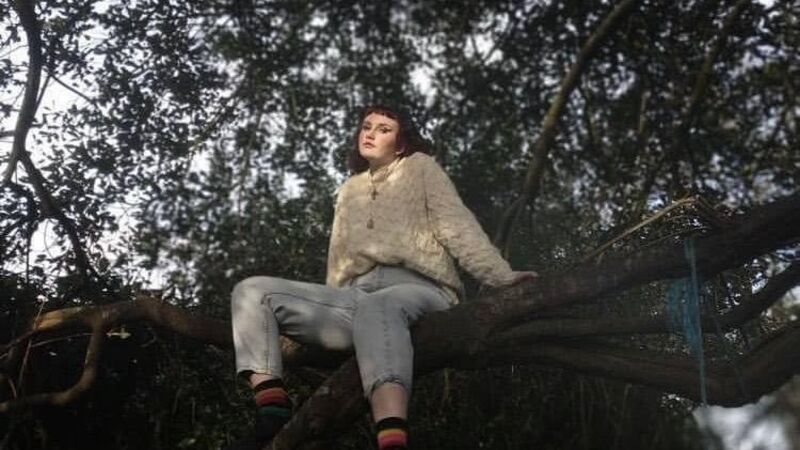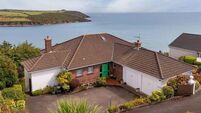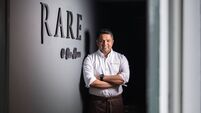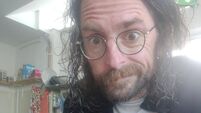Youth Matters: A great thing about queerness is how liberating it can be

Frankie Pyke Terrett, who features in this week's 'Youth Matters' series.
TODAY, I’m telling Frankie Pyke Terrett’s story.
Frankie is 17, based in East Cork, identifies as queer, and uses they/them pronouns.
I learned a lot about being openly queer in rural Ireland from this conversation and hope you can too.
Frankie has been involved with activist group YARI (Youth Against Racism and Inequalities) since just months after its inception and has been involved in both politics and protests for about six years now. Frankie is also incredibly passionate about music!
Frankie said: “I always knew I didn’t fit into… ‘girl’, like I always knew that and I only hung out with guys when I was a kid because the girls hated me! So I used to always say I was a tomboy, it was me trying to figure out that - oh, I’m masculine in my brain but in my body I’m a girl and I was like, of course... that means I’m a tomboy.”
Frankie continued to regale me with their queer awakening story and described how their identity was often unclear, even to themself.
“For years, I thought I was a lesbian because that was the only real representation. I realised I was into other women when I was pretty young but it took me a while longer to figure out that I like guys.”
Frankie reflects upon how around the time they were in 5th class, they heard the term ‘non-binary’ for the first time. Frankie describes the moment everything instantly clicked.
“I’m not all of those (lesbian, straight, tomboy, girl, boy), I’m none, I’m none of them,” said Franke.
Despite this understanding, on occasion, they still feel like that little, unsure kid. Frankie wonders if they’re non-binary, trans masculine or maybe they just do not like their body, and conceptualising this is much more difficult following a turbulent coming out.
“I didn’t come out, I was outed… I haven’t really been fully able to express my gender and my gender expression,” they said.
At this moment of the interview, I am touched with heartbreak for their experience. However, as Frankie shares their story so honestly, I feel so much compassion for the wonderful person Frankie is, all labels aside.
Furthermore, Frankie discussed how restrictive and rigid the labels, Lesbian, Gay, Bisexual, Trans and so on, can be in their opinion
“A great thing about queerness is how liberating it can be, kind of on the level of personal self-expression,” said Frankie.
Queerness is a broader, more expansive term used to encapsulate this community and all that it can be. Aside from google definitions of the word, I was interested to know what the word meant to Frankie, on a personal level..
“I think, to me, queerness, has always been a struggle and it’s one of those things I had an easy time coming to terms with on a personal level, but other people didn’t. The way that society views it, makes me who I am,” they said.
As distressing as it may be, if they hadn’t experienced the hate crimes, violence and abuse that has been hurled in their direction, Frankie doubts they would be as strong of a person.
Smiling, they spoke about how liberating queerness can be, given they don’t feel the pressure to comply to heteronormative beauty standards. Proudly, they happily explore outside society’s definition of ‘women’, free in their choice to stop shaving, dye their hair green and wear red eyeliner (which, coincidentally, I noticed Frankie was wearing the night of this chat).
Listening to Frankie speak, I begin to wonder what it is like being openly queer in rural Cork. Frankie candidly reflects upon their experience growing up in what they refer to as “a not nice area”. Given it’s a small town, with far less diversity than a big city, it has greatly shaped their experience. The one word that stood out to me was ‘hypocrisy’.
Often, Ireland seems to be depicted as a utopia for the LGBTQIA+ community given the fact that same-sex marriage was legalised through a referendum in 2015, making us the first country to do so. Undeniably, Ireland has become increasingly progressive in the last 100 years, and is far safer than the 69 countries that still have laws crimanlising homosexuality however homophobia still prevails in modern-day Ireland. Frankie described how people’s cruelty comes out mainly in the shadows of private settings.
“It’s bizarre, there’s a general sweep of ‘Sure, of course I’d never behave like that!’ but in reality, people are confronted with someone who is openly queer, you can really tell… and they’re disgusted.”
Frankie also expressed frustration surrounding the lack of education and exposure to LGBTQIA+ topics that many people in their area experience, and who therefore often use Frankie as a “learning point and not as a human being, which can be very hurtful because I have had years of changing rooms being like, ‘So, how does gay sex work? ‘But it’s like Google exists so I think a lot of people see me as a dictionary.”
Frankie summarised succinctly, ‘The place you live doesn’™t belong to you and you don’t belong to it. It’s quite ostracising really.”
I had the pleasure of conducting this interview in the midst of Pride Month which is celebrated annually each June to commemorate the Stonewall Riots of 1969. In Cork, a Pride Parade was held on the last day of July this year. In regards to Pride Month, Frankie noted that they chose to use this Pride as both a celebration and a protes; “homophobia sucks so it has to be both!”
It’s important to celebrate this community while acknowledging its discrepancies. Pride Month is a time that makes Frankie nostalgic, they recall their first experience at a Pride Parade when they were younger, naive and oblivious to the hate and turmoil in the world that they had yet to encounter: “I was the happiest I’d ever been, I saw people who looked like me and I saw people who loved like me and it really meant the world.”
Frankie wants to remind people that it’s a wonderful time to educate yourself on queer history, for media to focus on queer joy rather than hardship, and it presents an opportunity for younger queer people to feel comfortable asking questions and feel seen.
Interviewing Frankie, it has become clear to me that they are passionate about music, and it was fascinating to discover that Frankie believed that music and protest are often interlinked.
“There’s a huge rebellion in music, which you can see with the timeline of history and music evolving at the same pace.”
Frankie believes that music is political. “During times historically of economic hardship, that’s where punk and goth came from... we wouldn’t have the available queer representation without the music industry at all.”
They gave examples of how in the 70s and 80s, homosexuality was still criminalised in Ireland but gay music icons were the first exposure a lot of peolple had to queer culture. “You can always tell the state of that country by the music that’s being put out by black creators,” they continued.
“In the ’60s there was a lot of soul and after the civil rights movement there was a lot of funk and stuff like that. Now, if you hear a lot of rap, it’s very aggressive and there’s a lot of hurt in it which is a real tell-tale sign of what’s going on in the world.”
Frankie has shown me that music can portray oppression. I’ve come to understand the beauty of this message, that from such desolate, dark circumstances, music emerges. Oppression is turned into creativity, crafting songs that can simultaneously express anger and inspire hope. Frankie wholeheartedly agreed: “Music has saved my life - I wouldn’t be here if it wasn’t for the music I’ve had in my life.”
Finally, my last question is - do you think your voice is heard? Frankie answered me with complete, calm certainty, “No”. They recounted an experience with a politician where they grew fed up of how he reeled off a similar answer for everything and quipped, “Are you planning on actually implementing anything we’ve said?” He got incredibly flustered and left.
As a member of their student council, Frankie said there can be similar frustrations there, giving the example of asking for free period products in the student bathrooms.
I loved this conversation with Frankie and got so many insights into an openly, visibly queer experience in rural Ireland.
Next week: Amy interviews Laura Roche and Aine Casey.







 App?
App?


